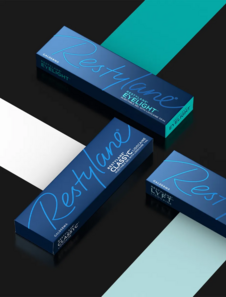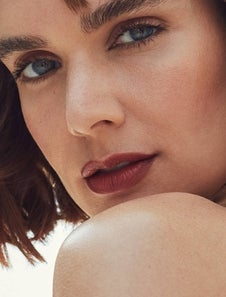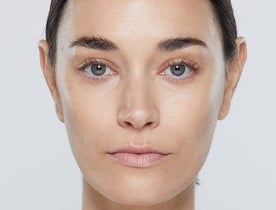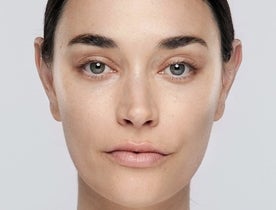DERMAL FILLERS FROM RESTYLANE®: DESIGNED DIFFERENTLY
Subtle tweaks or dramatic changes. With hyaluronic acid dermal fillers from Restylane® you can craft your own unique look—choosing from a range of fillers, from the firmest to the highest flexibility.1-3 Discover how Restylane® is designed differently.1-16
Dermal filler treatments in sync with your skin
Restylane® goes beyond just volumizing the face. Get everything from enhanced facial structure,
soft contours that maintain your natural expressions and a healthy glowing skin.2-11,14-20
Restylane® dermal fillers work in sync with your skin5,23 to help you achieve the results you
desire.17,18,20-22 Trusted by healthcare professionals for about 3 decades, Restylane® offers
a proven safety record.24,25

Select an area to
Chin and jawline
Add structure to your jawline and chin with Restylane® LYFT™3,8,21,37-41 and define your chin with Restylane® DEFYNE™.11,42
Lips
Natural, long-lasting and kissable lips with Restylane® KYSSE™, the no.1 injectors’ choice.13,26-30
Cheeks
Get natural-looking contour with Restylane® VOLYME™12,32-37 and lift your cheeks with Restylane®® LYFT™.3,8,21,37-41
Nasolabial folds
Smooth fine lines and wrinkles with RESTYLANE®, Restylane® DEFYNE and Restylane® REFYNE™.9,11,14

Select an area to
explore treatments
Chin and jawline
Add structure to your jawline and chin with Restylane® LYFT™3,8,21,37-41 and define your chin with Restylane® DEFYNE™.11,42
Cheeks
Get natural-looking contour with Restylane® VOLYME™12,32-37 and lift your cheeks with Restylane®® LYFT™.3,8,21,37-41
Nasolabial folds
Smooth fine lines and wrinkles with RESTYLANE®, Restylane® DEFYNE and Restylane® REFYNE™.9,11,14
Lips
Natural, long-lasting and kissable lips with Restylane® KYSSE™, the no.1 injectors’ choice.13,26-30

The first and original of dermal fillers
Restylane® is the first and original hyaluronic acid dermal filler, launched in 1996.24,25 Restylane® initiated the opportunity for millions of people all over the world to create their own look on their own terms with minimally-invasive aesthetic treatments.
If you are considering a dermal filler treatment, remember to always consult a qualified healthcare practitioner.

Are dermal fillers safe?
Restylane® utilizes hyaluronic acid similar to the hyaluronic acid we already have in our bodies.3,5 With minimal modification, Restylane® fillers are in sync with your skin.1,5,23
The safety of Restylane® is backed up by both practice and science. Today, millions of Restylane® treatments have been performed worldwide.24 As many as 407,000 patients have been evaluated regarding safety of the treatment in scientific studies.25
Before any treatment plan begins, your healthcare practitioner will discuss potential side effects with you.
would recommend Restylane® treatment to a friend43
said their cheeks looked natural21

Work with a healthcare practitioner near you to unlock the
potential of Galderma’s Restylane® range.
1. Galderma DOF. MA-56724 X-strain and G' including Shaype. [PLACEHOLDER to be replaced with full publication once available]. 2. Nikolis A, et al. J Drugs Dermatol. 2024;23(4):255–61. 3. Öhrlund Å, et al. J Drugs Dermatol. 2024;23(1):1332–6. 4. Belmontesi M, et al. J Drugs Dermatol. 2018;17(1):83–8. 5. Edsman K, et al. Dermatol Surg. 2012;38:1170–9. 6. Micheels P, et al. J Drugs Dermatol. 2016;15(5):600–6. 7. Restylane® SHAYPE™. IFU. August 2023. 8. Restylane® LYFT™. IFU. August 2023. 9. Restylane®. IFU. August 2023. 10. Restylane® EYELIGHT™. IFU. August 2023. 11. Restylane® DEFYNE™. IFU. August 2020. 12. Restylane® VOLYME™. IFU. August 2020. 13. Restylane® KYSSE™. IFU. August 2020. 14. Restylane® REFYNE™. IFU. August 2020. 15. Restylane® Skinboosters Vital Lidocane™. IFU. August 2022. 16. Restylane® Skinboosters Vital Light Lidocane™. IFU. August 2021. 17. Philipp-Dormston WG, et al. Dermatol Surg. 2018;44(6):826–32. 18. Solish N, et al. J Cosmet Dermatol. 2019;18(3):738–46. 19. Lee BM, et al. Arch Plast Surg. 2015;42(3):282–7. 20. Gregorio C, et al. Clin Cosmet Investig Dermatol. 2022;14:681–90. 21. Nikolis A et al. Poster presentation: The CHEEKY study: effectiveness of cheek treatment with hyaluronic acid fillers HAVOL and HALYF. Presented at: AMWC, Monte Carlo, Monaco.2022. 22. Percec I, et al. Plast Reconstr Surg. 2020;145:295–305. 23. Verpaele A, Strand A. Aesthetic Surg J. 2006;26(Suppl.):S10–7. 24. Galderma. Data on file. MA-39680. Global 55 million Restylane® treatments, update 2022. [PLACEHOLDER to be updated with latest Global treatment statistics DOF once available]. 25. Galderma. Data on file. MA-55607. Restylane® 27 years data publications analysis, 2023. 26. Bertucci, V et al. J Drugs Dermatol 2021; 20(4): 402–408. 27. Bertucci V et al. J Cosmet Dermatol 2021; 20(5): 1499–1504.
28. Hilton S et al. Dermatol Surg. 2018;44(2):261–9. 29. Nikolis A et al. Dermatol Surg. 2021;47(5):e168–73. 30. Global Restylane® and Hero SKU HCP perception Survey, Global Derm Pulse - 2024-08-27, InCrowd. 31. Nikolis A et al. Aesthetic Surgery Journal vol.42,3 (2022): 285-297. 32. Talarico S et al. Dermatol Surg. 2015;41(12):1361–9. 33. Jones D et al. J Drugs Dermatol. 2021;20(9):949–56. 34. Nikolis A et al. Aesthet Surg J Open Forum. 2020;2(1):ojaa005. 35. Kestemont P et al. J Drugs Dermatol. 2012;11(1 Suppl):s9–16. 36. Segura S et al. J Drugs Dermatol. 2012;11(1 Suppl):s5–8. 37. Rogerio V et al. J Stomatol Oral Maxillofac Surg. 2022;123(4):440–7. 38. Data on file (MA-43049). 39. Data on file (MA-34483). 40. Di Gregorio G et al. Clin Cosmet Investig Dermatol. 2022;15:681–90. 41. Lundgren B et al. J Drugs Dermatol. 2018;17(9):982–6. 42. Marcus K et al. Plast Reconstr Surg. 2022 Dec; 150(6): 1240–1248.
43. Andriopoulos B, et al. Facial augmentation with hyaluronic acid fillers in an Asian population. Poster AMWC 2019.
Always consult a healthcare professional for individualized treatment recommendations and to discuss important safety information and risks associated with the use of the products.




